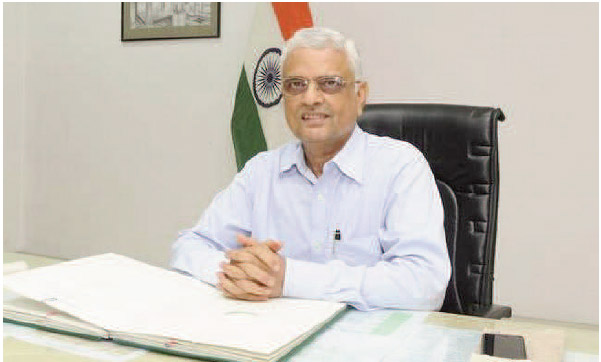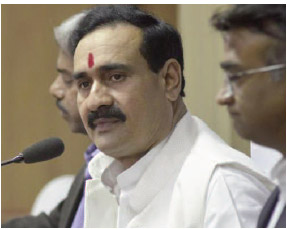A reticent of ficer's
anguish
 N D Sharma
N D Sharma
 O P Rawat
Election Commissioner O P
Rawat surprised his
admirers and detractors
alike by his outburst at the
blatant use of money and
misuse of government
machinery in the elections.
O P Rawat
Election Commissioner O P
Rawat surprised his
admirers and detractors
alike by his outburst at the
blatant use of money and
misuse of government
machinery in the elections.
This was
not the Rawat I had known from his
days in Madhya Pradesh, where he
served in various important positions
in the government; he was never
known to speak publicly, and that too,
in a harsh language, about what he
was thinking on an issue. His
detractors had, in fact, dubbed him as
a 'ghunna' (one who keeps his strong
feelings about something or
somebody within himself).
That even Rawat should have lost
his calm can only mean that the
electoral process has reached such a
low as to require immediate drastic
measures to keep the people's faith
intact in the elections. Democracy
thrives, Rawat observed, 'when
elections are free, fair and
transparent'. Rawat shared his distress
in his keynote address at the
consultation on electoral and political
reforms organised by Association for
Democratic Reforms (ADR) in New
Delhi in August.
He said, 'it has come to the notice of
the (Election) Commission that paid
operators run by PR firms are being actively deployed to shape public
opinion online. It appears to a cynical
common man that we have been
scripting a narrative that places
maximum premium on winning at all
costs to the total exclusion of ethical
considerations. In this narrative,
poaching of legislators is extolled as
small political management; strategic
introduction of money for allurement,
tough-minded use of State machinery
Rawat pointed out that 'although money was
necessary for political parties and candidates,
experience has shown that there is a real and
present risk that some parties and candidates, once
in office, will be more responsive to the interests of
a particular group of donors rather than to wider
public interest. Policy capture occurs when the
interests of a narrow group dominate those of other
stakeholders to the benefit of that narrow group'.
for intimidation, etc, are all
commended as resourcefulness'.
He said, 'the winner can commit no
sin; a defector crossing over to the
ruling camp stands cleansed of all the
guilt as also possible criminality. It is
this creeping new normal of political
morality that should be the target for
exemplary action by all political
parties, politicians, media, civil society
organisations, constitutional
authorities and all those having faith in
democratic polity for better election, a
better tomorrow'.
Rawat pointed out that 'although
money was necessary for political
parties and candidates, experience has
shown that there is a real and present
risk that some parties and candidates,
once in office, will be more responsive
to the interests of a particular group of
donors rather than to wider public
interest. Policy capture occurs when
the interests of a narrow group
dominate those of other stakeholders
to the benefit of that narrow group'.
Referring to the Election
Commission's objection to the
Electoral Bonds introduced by the
government, he observed that it might
lead to the use of black money in
electoral politics. Rawat said, 'the
recent amendments in the election
and income tax laws make it clear that
any donation received by a political
party through an Electoral Bond has
been taken out of ambit of reporting in
the Contribution Report which political
parties have to submit to the EC.
Implications of this step can be
retrograde as far as transparency is
concerned.
Furthermore, where contributions
received through Electoral Bonds are
not reported, a perusal of contribution
reports will not make it clear whether
the party in question has taken any
donations in violation of Section 29B of
the Representation of the People Act,
which prohibits political parties from
taking donations from government
companies and foreign sources'.
The Election Commission had, he
said, expressed apprehension that the
abolition of relevant provisions of the
Companies Act of removing a cap of
7.5 per cent of profit for political
donations can lead to money
laundering 'by setting up of shell
companies for diverting funds for
donations to political parties.
Rawat's plain speaking came
apparently in the light of the
developments during the Gujarat
Rajya Sabha elections in which blatant
use of money, government machinery
and intimidation was witnessed. BJP president Amit Shah was hailed as the
'manager' of the election strategy.
Rawat is the first person,
holding a constitutional
position directly related to
the conduct of elections, to
spell out publicly in a strong
language the ills vitiating
free and fair elections.
Politicians have for long
been voicing their concern
at the use of money and
muscle power in the
elections and demanding
electoral reforms – but only
when they were in the
opposition.
 Narottam Mishra
Shah did not take note of Rawat's
speech at ADR event directly.
Narottam Mishra
Shah did not take note of Rawat's
speech at ADR event directly.
But he
reacted to Rawat's observations in his
own way. During his three-day visit to
Bhopal a few days later, he opted to
have his lunch at the house of
Narottam Mishra to the exclusion of all
other party leaders. Narottam Mishra, Minister of Public Relations, Legislative
Affairs and Water Resources in the
Shivraj Singh Chouhan government, is
on a stay after he was found guilty of
'paid news' by the Election
Commission in June and disqualified
as well as barred from contesting
elections for three years.
The stay against the Election
Commission's order did not come to
him easily.
only when they were in the opposition.
A classic example is that of Lal
Krishna Advani. As BJP president in the
1980s, Advani scarcely opened his
mouth in public without making three
demands – Electoral Reforms,
amendment of the Police Act of 1861,
and surprise commando action to
destroy the training camps for
terrorists in the Pak-occupied Kashmir.
The last was a complicated issue
because of international implications.
But a decision on the other two,
Electoral Reforms and amendment of
Police Act of 1861 was, and is,
within the powers of the Government
of India. However, when Advani
became Home Minister and Deputy
Prime Minister in the Atal Behari
Vajpayee government, he did not,
even once during his entire tenure,
remember the two demands which he
had made vociferously as an
Opposition leader.




 N D Sharma
N D Sharma O P Rawat
O P Rawat Narottam Mishra
Narottam Mishra